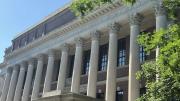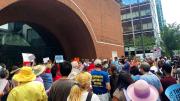Last spring, Harvard Faculty for Divestment (HFD) posted letters to President Drew Faust and the Harvard Corporation reiterating their call to shed endowment investments in companies that produce fossil fuels and calling for an open forum for community discussion of the issue (see “The Divestment Debate,” July-August, page 22).
In a July 10 e-mail posted on HFD’s website, William F. Lee, writing as the Corporation’s new senior fellow and on its behalf, responded to those messages. As he briskly noted at the outset, “We fully support President Faust’s conclusion in her letters of October 2013 and April 2014 that the most responsible, effective, and institutionally appropriate way for Harvard to confront the challenge of climate change is to intensify our academic efforts in this important domain through both research and education, to continue Harvard’s aggressive efforts to reduce the University’s own carbon footprint, and to otherwise promote sustainability in the day-to-day activities of our community. Like President Faust, we do not support divestment….” He declared that “engagement with energy-producing companies in shared research and development on both the improved efficiency of energy use and development of renewable sources of energy is more likely [to be effective] than divesting ourselves of investments in fossil fuels and distancing us from the companies that produce them.”
Having conferred during the summer, the faculty advocates responded in a letter to Lee dated September 9, observing, “[T]he difference between us is not about ends but means.” Pointing to recent research that concludes that pressure from equity investors and debt lenders does not influence companies’ decisions to disclose data on greenhouse gas (GHG) emissions, they suggested that remaining involved with fossil-fuel producers as stockholders was unlikely to be influential. Instead, they advocated a “divestment strategy [that] aims to make a difference—by stigmatizing the industry, highlighting artificial disparities in the marketplace, and opening up political space in which real alternatives can flourish.” They then renewed their call for a community forum on divestment.
Apart from divestment, other actions are being taken to reduce greenhouse-gas emissions directly. Yale president Peter Salovey announced some of the most interesting ideas in an August 27 briefing on “new sustainability initiatives.” He noted that Yale Corporation’s Committee on Investor Responsibility did not recommend divestment, but instructed its proxy-voting committee to “generally support” shareholder resolutions seeking disclosure of GHG emissions, the impact of climate change on a company’s business, and strategies designed to reduce its long-term impact on the global climate. Yale’s chief investment officer has contacted the managers who invest its endowment assets “to indicate that [they]…should take into account the effects of climate change on the businesses in which they are or might be investing,” The New York Times reported.
Yale also announced a $21-million investment in campus energy-conservation projects; a 1.25-megawatt solar installation; third-party verification of its GHG inventory and sustainability efforts by the Climate Registry; and, most unusual, research into the feasibility of imposing a carbon charge on campus (see “Time to Tax Carbon,” September-October, page 52).
As the divestment debate continues, higher-education institutions’ direct action on climate change—beyond their core research and teaching missions—seems to be broadening in inventive, productive ways.
For a more detailed report, see harvardmag.com/climates-14.





